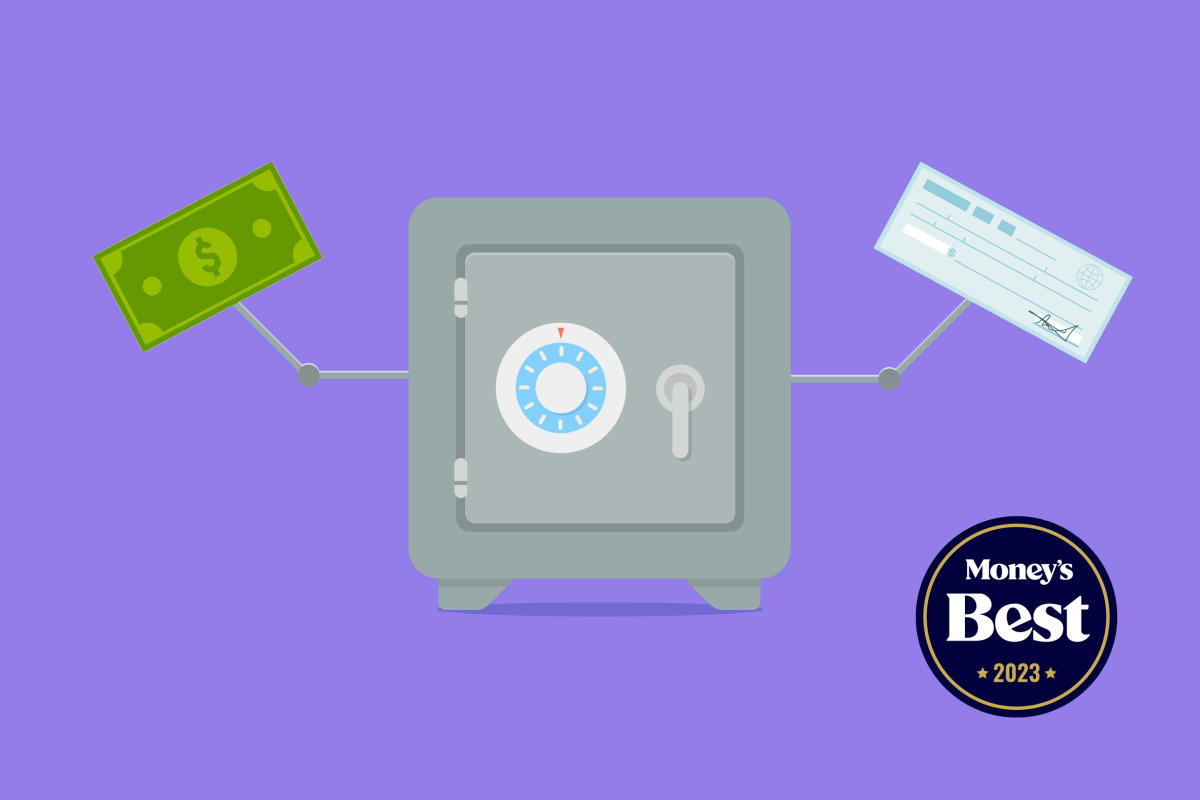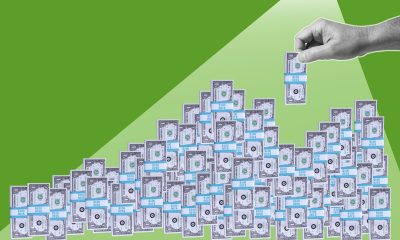Personal Finance
5 Best Money Market Accounts

-
Best for High APY with No Minimum Balance
Ally Bank
Our Partner
-
APY:
3.50%
-
Minimum Deposit to Open:
$0
-
Maintenance Fees:
$0
-
Debit Card:
Yes
Open an Account
-
-
Runner-Up for Best for High APY with No Minimum Balance
Sallie Mae
Our Partner
-
APY:
3.75%
-
Minimum Deposit to Open:
$0
-
Maintenance Fees:
$0
-
Debit Card:
No
Open an Account
-
-
Best for High APY with $5k Deposit
Western Bank
Our Partner
-
APY:
4.40%
-
Minimum Deposit to Open:
$5,000
-
Maintenance Fees:
$0
-
Debit Card:
No
Open an Account
-
-
Runner-Up for Best for High APY with $5k Deposit
UFB Direct
Our Partner
-
APY:
4.55%
-
Minimum Deposit to Open:
$5,000
-
Maintenance Fees:
$0 – $10
-
Debit Card:
Yes
Open an Account
-
-
Best for High APY with Widespread ATM Access
Discover
Our Partner
-
APY:
3.30%
-
Minimum Deposit to Open:
$2,500
-
Maintenance Fees:
$0
-
Debit Card:
Yes
Open an Account
-
Money Market accounts are deposit accounts that earn you interest on your balance. These give you the benefits of both checking and savings accounts because your money not only remains liquid — as in, you can access the funds — but also generates returns. Many people use money market accounts as emergency funds, while others use them for short-term financial goals.
There may be some restrictions on withdrawals depending on your financial institution, but money market accounts generally pay a higher annual percentage yield (APY) than savings accounts. Annual percentage yields on money market accounts are currently high, with many financial institutions offering between 2.00% and 4.50%.
Money market deposit accounts are also considered low-risk because the federal government insures them up to $250,000 through the Federal Deposit Insurance Corporation (FDIC) or the National Credit Union Administration (NCUA).
Our Top Picks for Best Money Market Accounts of 2023
-
Ally Bank: Best for High APY with No Minimum Balance
-
Sallie Mae: Runner-up for High APY with No Minimum Balance
-
Western Bank: Best for High APY with $5K Deposit
-
UFB Best Money Market Account: Runner-up for Best for High APY with $5K Deposit
-
Discover: Best for High APY with Widespread ATM Access
Best Money Market Accounts Reviews
Pros
-
No overdraft fees
-
Smartphone check deposit
-
Includes debit card
-
Unlimited ATM withdrawals
Cons
-
The outgoing domestic wire fee is $20
-
No cash deposits
HIGHLIGHTS
- APY
- Minimum deposit to open
- Maintenance fees
With an annual percentage yield of 3.50% and no minimum deposit requirement to open, the Ally Bank Money Market Account is ideal for new savers. There is no monthly fee on this account, regardless of your balance.
Deposits can be made via multiple routes: Remote deposit on your smartphone, electronic transfer online, ACH deposit through your employer, wire transfers and checks by mail. All Bank Money Market Account offers unlimited ATM withdrawals.
Transactions made at 43,000 Allpoint ATMs across the U.S. are free, and the bank reimburses up to $10 monthly in ATM fees from other ATMs. Ally Bank also allows unlimited transfers to other accounts via online and mobile banking. (This feature may be temporary. Please be sure to check your account before making more than the standard six transfers per statement cycle.)
Pros
-
No opening deposit
-
No minimum balance
-
Mobile deposit via app
-
Check-writing privileges
Cons
-
No debit card
-
Most deposits do not process immediately
-
The outgoing wire transfer fee is $20
-
Limits on mobile check deposits
HIGHLIGHTS
- APY
- Minimum deposit to open
- Maintenance fees
Yes, Sallie Mae has more to offer than only student loans, and one is the Sallie Mae Money Market Deposit Account. There’s no minimum balance requirement to open the account — a helpful feature for people who may be starting small with their initial savings deposits — and no monthly fees are applied. Plus, all customers qualify for the 3.60% annual percentage yield, no matter how little (or how much) you’ve allocated to your money market account.
Deposits can be made through the Sallie Mae mobile app, direct deposits, ACH transfers from other financial institutions or by sending a check to Sallie Mae’s Chicago office. However, for the first 30 days after opening your account, all deposits are held for five business days. Later, ACH credits will process immediately, but check and electronic deposits will still take five days to process. Additionally, mobile deposits are limited to 10 deposits per month.
Transfers of funds to accounts you’ve linked to your banking profile are processed within two or three business days. The Sallie Mae money market account does not provide a debit card, so customers have no instant access to cash. Still, there is no limit on how many transfers you can make to other accounts. You can also access funds via checks, which are offered at no cost at the time of account opening.
Pros
-
Zero monthly maintenance fees
-
No minimum deposit or balance requirements
-
No fees for transferring to and from other financial institutions
Cons
-
No physical branches
-
$10 excessive transaction fee
-
$25 overdraft fee
-
No checks or debit cards
HIGHLIGHTS
- APY
- Minimum deposit to open
- Maintenance fees
Based in North Dakota, Western State Bank combines the best elements of traditional high-yield savings and money market accounts to form its High Yield Money Market product. While there’s no minimum balance requirement or fees, an initial deposit of $5,000 is required to open an account.
That makes it ideal for people ready to set aside a lump sum for interest accrual, while retaining the option to use the bulk of those funds if needed — without being penalized for a low balance. In fact, each month you can make up to 10 withdrawals or debits, which is more than the standard six allowed.
While Western State Bank doesn’t offer a mobile check deposit option for its High Yield Money Market accounts, there are several other ways to fund your account. You can make ACH transfers, wire transfers (no limits, 10x per month, one outgoing and income per month reimbursed) and send checks to Western overnight with delivery and shipping fees covered by the bank. There is a waiting period of 60 days after opening before you can link external accounts, but once you set that up, transfers are simple to process online.
Pros
-
SMS banking without Wi-Fi
-
Debit card included
-
Checks included
-
Mobile deposit via app
Cons
-
Minimum $5,000 to open account
-
$10 monthly fee if daily balance is below $5,000
-
Six withdrawals per month maximum
HIGHLIGHTS
- APY
- Minimum deposit to open
- Maintenance fees
If you’re ready to deposit $5,000 into a new money market account, the Preferred Money Market Account offered by UFB Direct, an Axos Bank brand, could be a great fit. The account comes with checks and a debit card, which can be used at more than 60,000 ATMs at no charge.
Deposits can be made through online transfers from an external account or through mobile check deposit. So long as you maintain a balance of $5,000 or greater, the account is free to use. If your balance drops below that amount, you’ll be charged a $10 monthly fee.
One caveat: Transaction limitations are specific to each account holder. When you set up your account with UFB Direct, a representative will discuss options with you. Be sure to find out what kind of withdrawals and transfers are limited — and ask specifically if any specific kind is not.
Pros
-
No minimum balance requirement
-
Free debit card access at 60K+ ATMs
-
Mobile check deposit
-
Free overdraft protection
Cons
-
$2,500 minimum to open
-
Withdrawals capped at six per month
-
Must enroll in direct deposit for full APY on both accounts
HIGHLIGHTS
- APY
- Minimum deposit to open
- Maintenance fees
Account holders of Discover’s money market product aren’t charged fees for maintenance or overdrafts. There’s no minimum balance fee, either — but an initial deposit of $2,500 is required to open the account. Those who are prepared to meet that requirement benefit from a high APY of 3.30%. Balances of $100,000 and more get the highest APY at 3.35%.
Additionally, Discover has an extensive ATM network, with over 60,000 AllPoint and MoneyPass ATMs that you can access free of charge. To deposit money, customers can use the mobile check deposit feature on the app, set up direct deposit or make online transfers from external banks. Discover Bank also accepts checks by mail.
Other money market accounts we considered
Synchrony Bank – Money Market
Pros
-
No minimum opening deposit
-
No monthly fees
-
Checks provided
-
Debit card provided
Cons
-
APY is only 2.25%, lower than other financial institutions
-
Account subject to closure if $0 balance for 60-plus days
Synchrony Bank’s money market account is a virtually free product, with no minimum balance requirement and no maintenance fees. There’s no minimum amount required to open an account, either. Debit cards and checks are also included.
Why Synchrony Bank didn’t make the cut: Money market accounts at other financial institutions have a higher APY than the 2.25% Synchrony Bank currently offers.
CIT Bank – High Yield Money Market
Pros
-
No monthly service fees
-
Link Zelle to send and receive funds
-
Mobile check deposit
Cons
-
APY is 1.55%, lower than other financial institutions
-
Minimum opening deposit $100
CIT Bank’s money market account is one of few that includes the option to link Zelle, a peer-to-peer payment platform, to send and receive money. It’s also free of monthly maintenance charges — but an initial deposit of $100 or more is required to open a CIT High Yield Money Market account.
Why CIT Bank didn’t make the cut: The interest rate for CIT Bank’s High Yield Money Market account is 1.55%, which is lower than what many other financial institutions currently offer.
TIAA Bank – Yield Pledge Money Market Account
Pros
-
No monthly account fee
-
Mobile check deposits
Cons
-
$500 minimum to open
-
APY for less than $10K is only 1.60%
The Yield Pledge Money Market Account from TIAA Bank offers a high annual percentage yield at 3.45%, but to get this rate, your balance will need to be higher than the $500 minimum required to open the account. The balance tiers for interest rates are as follows: 1.60% for $9,999.99 and less; 2.25% for $10,000 to $24,999.99; 2.70% for $25,000 to $49.999.99; 3.10% for $50,000 to $99,999.99; 3.45% for $100,000 and greater.
Why TIAA Bank didn’t make the cut: To get the best APY with the bank’s Yield Pledge Money Market Account, you need to have $100,000 in your account.
Best Money Market Accounts Guide
What is a money market account?
A money market account (MMA) is a type of savings account that earns interest, which is typically expressed as its annual percentage yield (APY). Most MMAs come with a debit card and checks, though withdrawals are typically limited to six per month or statement cycle. The Federal Deposit Insurance Corporation (FDIC), an independent agency of the U.S. government, insures money market accounts for up to $250,000.
What is a high-yield money market account?
A high-yield money market account is very much like a typical money market account. The distinction of high yield indicates that the account’s annual percentage yield (APY) is higher than a traditional savings account. Like MMAs, minimum initial deposits, minimum account balances and transaction limits can vary across financial institutions.
How does a money market account work?
Money market accounts are interest-bearing deposit accounts, meaning your funds will earn interest. The interest is expressed as an annual percentage yield (APY) which, with most accounts, is calculated daily based on your end-of-day balance and credited monthly. However, money market accounts are best for long-term savings. For example, in five years’ time, a money market account with a $5,000 balance and an APY of 3.30% will earn $882 in interest.
Are money market rates fixed?
Money market rates are not fixed; they are variable. An account’s annual percentage yield (APY) is subject to change at any moment and without notice at the discretion of the financial institution. Increases or decreases in rates can be caused by a number of factors, such as a financial institution’s response to Federal Reserve policies or the rates of competitors.
Best money market rates
Below are some sample rates from money market accounts with high interest rates. Note: Minimum balance requirements, monthly fees and other requirements for opening and maintaining an account vary by bank.
|
Bank |
Annual Percentage Yield (APY)* |
|
Ally Bank – Money Market Account |
3.50% |
|
Synchrony Bank – Money Market Account |
2.25% |
|
Discover – Money Market Account |
3.30% |
|
Western – High Yield Money Market |
4.40% |
|
Sallie Mae – Money Market Account |
3.75% |
|
UFB – Preferred Money Market Account |
4.55% |
*Annual percentage yields are subject to change.
Pros
-
Many accounts offer annual percentage yield rates of 2% or more
-
Easy access to deposits through ATMs, checks, or transfers
-
Little to no risk involved: MMAs are insured by government agencies (FDIC and NCUA) for up to $250,000
Cons
-
Withdrawals may be limited to six per month; exceeding this amount may incur a fee
-
Some accounts have minimum opening and minimum balance requirements
-
Some accounts have maintenance fees that are only waived with higher balances
How to choose a money market account
The best money market accounts have high annual percentage yield rates and zero or low monthly fees. If you want frequent access to your money market funds, check the account policy on transfers to outside accounts, as some institutions limit withdrawals to six per month or statement cycle. Additionally, a debit/ATM card and checks are bonuses, not standard — be sure to thoroughly review account features.
How to open a money market account
Opening a money market account is as simple as signing up on the financial institution’s website or visiting a bank or credit union branch in person. It’s customary for the financial institution to request personal information such as date of birth and Social Security number. Some financial institutions require customers to make a minimum deposit to open a money market account.
Other alternatives to money market accounts
Money market accounts vs high-yield savings accounts
Interest rates for money market accounts and high-yields savings accounts are currently quite similar. The two financial products share other features too, but there are a few key differences.
|
Money market account |
High-yield savings account |
|
Interest rate maximum is 5.08% per FDIC |
Interest rate maximum is 5.08% per FDIC |
|
Often comes with a debit card for use at ATMs or businesses |
Does not typically come with a debit card |
|
Typically comes with checks |
Does not typically come with checks |
|
Can transfer to and from external accounts, though transfers may be limited to six per month or statement cycle |
Can transfer to and from external accounts, though transfers may be limited to six per month or statement cycle |
|
May have minimum balance requirement (varies by financial institution) |
Usually no minimum balance requirement (varies by institution) |
|
May charge maintenance fee (varies by financial institution) |
Usually no maintenance fee (varies by institution) |
Money market accounts vs certificates of deposit
Money market accounts and certificates of deposit (CDs) offer different methods for helping you make the most of your money. Note: CD rates often have higher interest rates than those of money market accounts, but not always.
|
Money market account |
Certificate of deposit (CD) |
|
Add or withdraw money to your balance while account is open |
Account holds a fixed amount |
|
Earns interest on balance while the account is open |
Earns interest on fixed amount CD for fixed period of time, e.g., three months, one year, five years |
|
Interest rate is subject to change |
Fixed interest rate |
|
No penalty for withdrawing funds (within monthly or statement cycle limitations) |
May incur fee for early withdrawal |
|
FDIC or NCUA insured up to $250,000 |
FDIC insured up to $250,000 |
|
Open account through bank or credit union |
Purchase through bank, brokerage firm or independent salesperson |
|
Minimum deposit may be required |
Minimum purchase may be required to open account |
Money market accounts vs money market funds
While they sound similar, money market accounts and money market funds, also called money market mutual funds, are two entirely different products. (Those who are new to investing may need some guidance if they’re interested in money market funds. Read up on how to choose a financial advisor to get started.)
|
Money market account |
Money market fund |
|
It is owned by a bank |
It is sponsored by an investment fund |
|
Savings account that holds money |
Investment account that holds a bundle of securities, e.g. certificates of deposit, Bankers’ Acceptances, commercial paper (short-term, unsecured debt), treasury bill, repurchase agreement |
|
FDIC or NCUA insured up to $250,000 |
Not federally insured |
|
Variable interest earned based on bank/credit union rates |
Variable interest earned based on market values |
|
Open online or at branch and deposit money |
Opened through a brokerage |
|
May have monthly maintenance fee |
May have management fees (also called the expense ratio) |
|
Access to funds through a limited number of withdrawals (e.g. transfers), plus debit card and checks |
Access to funds is unlimited |
Latest News
The Federal Deposit Insurance Corporation (FDIC) issued new rate information for money market accounts and other deposit products on February 21, 2023. The interest cap is currently set at 5.08% for all FDIC-insured money market accounts.
Many banks and credit unions have increased their money market account rates to almost meet this maximum. Financial institutions like those on our top picks offer annual percentage yields from 3.40% to 4.55%. These rates are on par or even higher than some of the best savings accounts and best high-yield savings accounts available today. These high-APY accounts are coming not only from the best online banks, which typically offer the best rates on all financial products, but also from well-known institutions, such as Discover.
Best Money Market Accounts FAQ
What are the best money market accounts?
Since the point of a money market account is to earn money from your savings, the best money market accounts have competitive interest rates. Many banks offer annual percentage yield rates between 2.00% and 4.50%. (Per FDIC regulations as of February 21, 2023, money market account interest rates cannot be higher than 5.08%.)
The ideal account won’t include a minimum balance fee or a monthly maintenance fee. Debit cards and checks are provided with many accounts, and some banks do not have limitations on certain types of transactions, such as ATM withdrawals.
Are money market accounts worth it?
Money market accounts are a great way to earn interest on savings. Annual percentage yields are currently high, with some financial institutions offering between 2.50% and 4.50%. However, the amount of interest earned will depend not only on the rate offered, but also on your balance. The higher your balance, the more you’ll earn.
Are money market accounts taxable?
Yes. You are required to report interest earned through your money market account to the Internal Revenue Service. The bank or credit union is required to provide you with a 1099-INT form ahead of tax season. The form will show how much interest your account accrued in the year prior.
How does a money market account compare to a checking account?
While some of the best checking accounts today generate interest on your balance, the annual percentage yield is usually much lower than what’s offered with a money market account (MMA). However, unlike a checking account, MMAs often carry monthly transaction limitations, and some accounts include only checks and no debit card.
What is the maximum number of withdrawals per month for a money market account?
Money market accounts often have withdrawal limits. Typically, they’re limited to six withdrawals or payments by check, debit card, draft or transfer to another account per the Federal Deposit Insurance Corporation (FDIC) and the National Credit Union Administration (NCUA).
Note that debit card payments, ATM withdrawals with a debit card, in-person withdrawals and withdrawals by mail or telephone are not included; limits, if any, on these transactions are determined by the financial institution of your money market account.
Is a money market account safe?
Yes, money market accounts are safe. Funds are insured up to $250,000 per account holder by either the Federal Deposit Insurance Corporation (FDIC) or the National Credit Union Administration (NCUA).
How We Chose the Best Money Market Accounts
Our methodology in creating our 5 Best Money Market Accounts of 2023 included researching nearly 50 financial institutions, ranging from national banks, regional banks, federal credit unions and online savings accounts.
Annual percentage yield rates played a major role in determining whether or not a financial institution’s money market product made our list. We compared competitive APYs to national average rates and showcased financial institutions with the highest interest rates.
We also considered monthly fees, minimum balance requirements and how customers can access funds (debit cards, checks, transfers). We ensured all financial institutions featured are classified as member FDIC or NCUA.
Though we always try to include accurate and up-to-date information on regulatory and legal actions, we don’t claim this information is complete or fully up to date. Interest rates/annual percentage yields are subject to change. As always, we recommend you do your own research as well.
Summary of Money’s 5 Best Money Market Accounts
-
Ally Bank: Best for High APY with No Minimum Balance
-
Sallie Mae: Runner-up for High APY with No Minimum Balance
-
Western Bank: Best for High APY with $5K Deposit
-
UFB Best Money Market Account: Runner-up for Best for High APY with $5K Deposit
-
Discover: Best for High APY with Widespread ATM Access
© Copyright 2023 Money Group, LLC. All Rights Reserved.
This article originally appeared on Money.com and may contain affiliate links for which Money receives compensation. Opinions expressed in this article are the author’s alone, not those of a third-party entity, and have not been reviewed, approved, or otherwise endorsed. Offers may be subject to change without notice. For more information, read Money’s full disclaimer.
Read the full article here

-

 Side Hustles7 days ago
Side Hustles7 days agoHow Charlotte’s Rally Pickleball Got Its Start
-

 Make Money7 days ago
Make Money7 days ago5 Surprising Ways Trump’s Trade Agenda Could Affect What You Pay at Checkout
-

 Investing7 days ago
Investing7 days agoQuantum stock soars on new file system client By Investing.com
-

 Side Hustles5 days ago
Side Hustles5 days agoKickstart Your Year With These Entrepreneurial Health Checkups
-

 Side Hustles4 days ago
Side Hustles4 days agoExpand Your Global Reach with Access to More Than 150 Languages for Life
-

 Side Hustles3 days ago
Side Hustles3 days agoKFC Announces Saucy, a Chicken Tenders-Focused Spinoff
-

 Investing3 days ago
Investing3 days agoPalantir, Anduril join forces with tech groups to bid for Pentagon contracts, FT reports By Reuters
-

 Side Hustles4 days ago
Side Hustles4 days agoThis AI is the Key to Unlocking Explosive Sales Growth in 2025


















